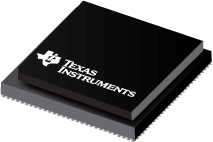In most customer applications, a high level of decoding bit error rate (BER) performance is required. Since Convolutional codes and Turbo codes are widely used in wireless communication systems, TI DSPs integrate two high-performance embedded coprocessors (enhanced Viterbi decoder coprocessor and enhanced Turbo decoder coprocessor) that significantly speed up channel-decoding operations on-chip.
PDF, 54 Kb, Archivo publicado: oct 3, 2016
This document is a collection of frequently asked questions (FAQ) on running the NDK examples on the KeyStoneв„ў family of devices.
PDF, 3.2 Mb, Archivo publicado: oct 9, 2014
This document describes the organization, structure, and proper usage of the TI serializer and deserializer (SerDes) IBIS-AMI models for Keystone DSP Hyperlink interface.
PDF, 4.8 Mb, Archivo publicado: oct 9, 2014
This document describes the organization, structure, and proper usage of the TI serializer and deserializer (SerDes) IBIS-AMI models for Keystone DSP PCIe interface.
PDF, 590 Kb, Archivo publicado: oct 31, 2012
The goal of KeyStone I SerDes collateral material is to make system implementation easier for the customer by providing the system solution. For these SerDes-based interfaces, it is not assumed that the system designer is familiar with the industry specifications, SerDes technology, or RF/microwave PCB design. However, it is still expected that the PCB design work will be supervised by a knowledge
PDF, 1.7 Mb, Revisión: C, Archivo publicado: sept 15, 2013
PDF, 245 Kb, Revisión: A, Archivo publicado: abr 25, 2011
PDF, 114 Kb, Revisión: E, Archivo publicado: oct 28, 2016
The initialization of the DDR3 DRAM controller on KeyStone I DSPs is straightforward as long as the proper steps are followed. However, if some steps are omitted or if some sequence-sensitive steps are implemented in the wrong order, DDR3 operation will be unpredictable.All DDR3 initialization routines must contain the basic register writes to configure the memory controller within the DSP
PDF, 138 Kb, Archivo publicado: abr 13, 2016
The serializer-deserializer (SerDes) performs serial-to-parallel conversions on data received from a peripheral device and parallel-to-serial conversion on data received from the CPU. This application report explains the SerDes transmit and receive parameters tuning, tools and some debug techniques for TI Keystone I and Keystone II devices.
PDF, 320 Kb, Archivo publicado: dic 13, 2011
PDF, 20 Kb, Revisión: A, Archivo publicado: nov 10, 2010
The C6000 compiler tools support a new ELF-based ABI named EABI. Prior to this time, the compiler only supported a single ABI, which is now named COFF ABI. The following compelling best-in-class features are available under the C6000 EABI:GeneralZero-init globals: “int gvar;” gets set to 0 before main runs.Dynamic linking: Add code to a running system.Native ROM
PDF, 1.5 Mb, Archivo publicado: nov 9, 2010
PDF, 585 Kb, Archivo publicado: nov 9, 2010
PDF, 582 Kb, Revisión: B, Archivo publicado: jun 5, 2014
PDF, 1.8 Mb, Revisión: B, Archivo publicado: agosto 29, 2012
As application complexity continues to grow, we have reached a limit on increasing performance by merely scaling clock speed. To meet the ever-increasing processing demand, modern System-On-Chip solutions contain multiple processing cores. The dilemma is how to map applications to multicore devices. In this paper, we present a programming methodology for converting applications to run on multicore
Linea modelo
Clasificación del fabricante
- Semiconductors > Processors > Digital Signal Processors > C6000 DSP > C66x DSP
